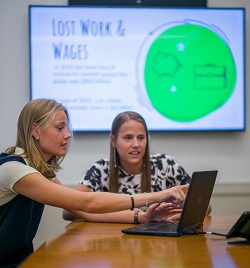Mentorship and First Drafts Are Pivotal to Undergraduate Research
This summer, I have been conducting research on the impact of the COVID-19 pandemic on women’s lives as well as finding and pursuing solutions to solve inequities in society that were exasperated by the pandemic. I took my first week of research to focus on an overview of problems which primarily impacted women during the pandemic. This required finding different articles through the UNH library as well as reading those suggested by my mentor. I conducted this research primarily from my computer at home. I was slowly able to grasp an understanding of the connections that tied many of these inequalities together. I then narrowed my focus on the background conditions that allowed these problems to manifest themselves into society for decades leading up to the pandemic.
After five weeks of researching and understanding feminist philosophy, intersectionality, and the overall impact of the pandemic, I could identify the key problems that betrayed women pre-pandemic and that have only worsened since. I noted an array of different issues such as a lack of women in science, inequalities in terms of medical care, childcare, the wage gap, androcentric work norms, financial health as well as domestic violence. I then tried to combine all my thoughts into an exceptionally long and intense first draft. This was a little bit painstaking, but it was worth it because I could see some of my own ideas forming as a result of the vast amount of research I had conducted.

At about week six of the project, I had a very long first draft that I proceeded to make longer and longer by adding more and more ideas from feminist philosophy theories and articles I had read. The draft was structured with background issues that set women up for failure during the pandemic and then dove into how women were impacted. Each step of the way my mentor gave me advice on different structural changes to make. However, I started to realize for my final product I wanted to craft a short op-ed that would highlight my main argument and clearly depict my findings. My mentor was able to realize that the thesis for my argument was hidden right at the bottom of one of my lengthy first drafts. I then condensed the piece down to about one fifth of the original length with a clear message throughout and a focus on women's unemployment and lost wages throughout the pandemic, as well as the importance of access to childcare.
Through this research process I got a taste of the importance of first drafts and how the writing process helps get you closer to a final product. The experience allowed me to understand what I had learned, which then enabled me to move forward to craft my own conclusions. Once I established my focus on why access to childcare is important for everyone to support, and how it can promote women’s equality, I began to work tirelessly on editing the op-ed. I also created a project to present to my mentor’s Business Ethics course, focusing on statistics of women's oppression, how female mentors could be lost due to the pandemic’s economic toll on women, the importance of making the child tax credit permanent as well as the need for everyone to support access to quality childcare.
Throughout my ten weeks of summer research, I started each day with a cup of coffee, notes on what I wanted to learn and pursue that day, along with a freshly charged computer. Near the end of the 10-weeks I also started to meet with my mentor in person, but prior to this we met via Zoom every Monday. I am so grateful for this opportunity, especially since as a Finance and Economic major this project was a little outside the scope of the degrees I am earning. However, it has taught me several life skills such as the ability to create and then delegate tasks to myself to complete. The Research Experience and Apprenticeship Program gave me the opportunity to understand a problem I was passionate about, while simultaneously giving me the tools to build a final product that demonstrated my individual growth.
